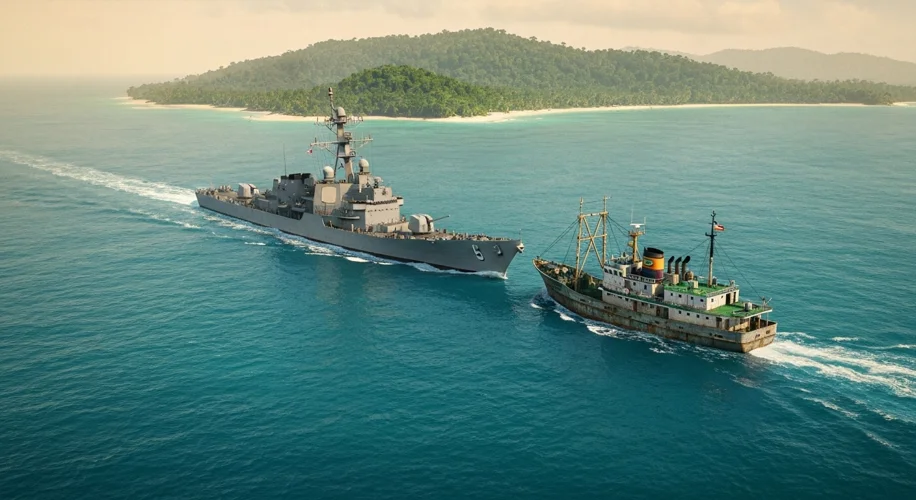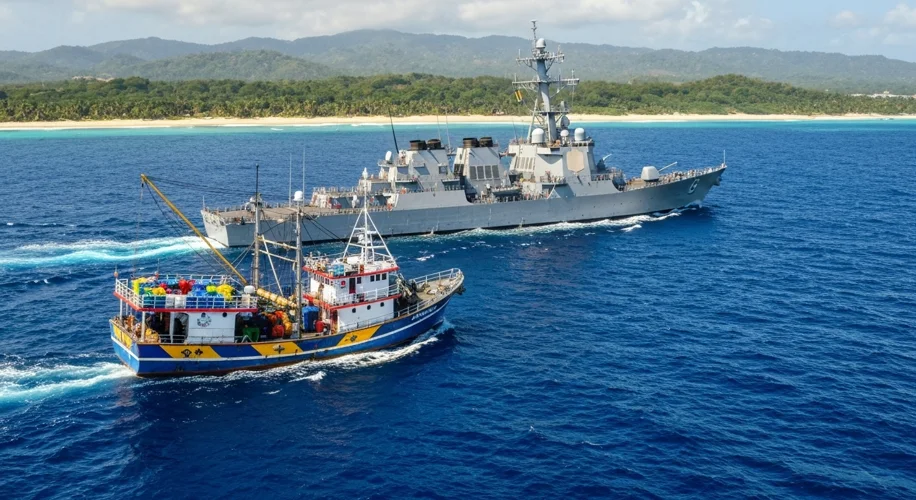The vast expanse of the ocean has always been a stage for complex geopolitical maneuvering, a silent theater where nations test boundaries and probe vulnerabilities. Decades before the turn of the millennium, such a drama unfolded in the waters near Venezuela, involving a Venezuelan tuna vessel and the formidable presence of the United States Navy. This incident, though perhaps not etched in the grand annals of global conflict, offers a fascinating glimpse into the delicate dance of maritime diplomacy, the ever-present specter of espionage, and the shifting power dynamics that characterized the pre-2000 era.
Imagine the scene: the Caribbean sun glinting off the waves, the rhythmic hum of a fishing vessel at work. Suddenly, the horizon is broken by the imposing silhouette of a foreign warship. This was the reality for the crew of a Venezuelan tuna boat intercepted by a U.S. naval vessel. The exact date and specific vessels involved are often lost to the fog of declassified archives, but the implications were clear. Venezuela, a nation with a complex relationship with its powerful northern neighbor, was asserting its maritime sovereignty. The United States, with its global reach and strategic interests, was keen on maintaining its presence and influence.
The cultural context of the time is crucial. Venezuela, under various political administrations, often sought to forge an independent path, sometimes in direct contrast to U.S. foreign policy. This could manifest in its stance on oil production, its regional alliances, or its approach to maritime law. For the U.S. Navy, operating in the Caribbean was not just about freedom of navigation; it was about projecting power, protecting trade routes, and gathering intelligence in a region of perennial strategic importance.
At the heart of such an incident were likely two key players: the captain and crew of the Venezuelan tuna vessel, and the commanding officer and crew of the U.S. warship. For the Venezuelans, their primary concern would have been the safe passage and livelihood of their vessel, while simultaneously upholding their nation’s territorial integrity. From the U.S. perspective, the interception could have been a routine patrol, a response to a suspected infraction of international maritime law, or, more intriguingly, a calculated move to gather intelligence. Was the tuna vessel merely fishing, or was it serving as a cover for something more? The possibility of espionage, however remote, always hangs in the maritime air.
The interception itself would have been governed by strict naval protocols. Communication would have been key, a tense exchange of signals and hails across the water. Was the U.S. vessel enforcing a blockade, conducting a search, or simply asserting its right to challenge a vessel in international or disputed waters? The ambiguity inherent in such encounters is what makes them so compelling. Without clear, publicly released details, the incident invites speculation. Could the U.S. Navy have been testing Venezuelan responses to naval presence? Were they monitoring shipping lanes for illicit activities that might be linked to regional conflicts or power plays?

The consequences of such an event, while not leading to outright conflict, could have ripple effects. Diplomatic channels would likely have been activated, with Venezuela lodging a protest and the U.S. offering a justification. These exchanges, often conducted behind closed doors, reveal the subtle nuances of international relations. The incident could have also served as a deterrent, a reminder to Venezuela of the U.S. naval capacity and willingness to assert its interests. Conversely, it could have galvanized nationalist sentiment within Venezuela, reinforcing a narrative of resisting foreign influence.
Analyzing such maritime encounters requires an understanding of the broader geopolitical landscape. The pre-millennium era was marked by the lingering shadows of the Cold War, and while the Soviet Union had dissolved, proxy conflicts and regional power struggles continued. The Caribbean, with its complex history and strategic location, remained a focal point for superpower engagement. Incidents like the interception of the Venezuelan tuna vessel, therefore, were not isolated events but rather threads in a larger tapestry of global power dynamics. They highlight the constant tension between national sovereignty and international cooperation, between legitimate maritime activity and the covert pursuit of strategic advantage. The sea, in its immeasurable depth, continues to hold the secrets of these silent encounters, reminding us that history is often written not just in grand declarations, but in the quiet dramas played out on the waves.

